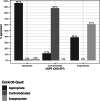Quality use of medicines in patients with chronic kidney disease
- PMID: 32503456
- PMCID: PMC7275522
- DOI: 10.1186/s12882-020-01862-1
Quality use of medicines in patients with chronic kidney disease
Abstract
Background: Chronic kidney disease (CKD) affects drug elimination and patients with CKD require appropriate adjustment of renally cleared medications to ensure safe and effective pharmacotherapy. The main objective of this study was to determine the extent of potentially inappropriate prescribing (PIP; defined as the use of a contraindicated medication or inappropriately high dose according to the kidney function) of renally-cleared medications commonly prescribed in Australian primary care, based on two measures of kidney function. A secondary aim was to assess agreement between the two measures.
Methods: Retrospective analysis of routinely collected de-identified Australian general practice patient data (NPS MedicineWise MedicineInsight from January 1, 2013, to June 1, 2016; collected from 329 general practices). All adults (aged ≥18 years) with CKD presenting to general practices across Australia were included in the analysis. Patients were considered to have CKD if they had two or more estimated glomerular filtration rate (eGFR) recorded values < 60 mL/min/1.73m2, and/or two urinary albumin/creatinine ratios ≥3.5 mg/mmol in females (≥2.5 mg/mmol in males) at least 90 days apart. PIP was assessed for 49 commonly prescribed medications using the Cockcroft-Gault (CG) equation/eGFR as per the instructions in the Australian Medicines Handbook.
Results: A total of 48,731 patients met the Kidney Health Australia (KHA) definition for CKD and had prescriptions recorded within 90 days of measuring serum creatinine (SCr)/estimated glomerular filtration rate (eGFR). Overall, 28,729 patients were prescribed one or more of the 49 medications of interest. Approximately 35% (n = 9926) of these patients had at least one PIP based on either the Cockcroft-Gault (CG) equation or eGFR (CKD-EPI; CKD-Epidemiology Collaboration Equation). There was good agreement between CG and eGFR while determining the appropriateness of medications, with approximately 97% of the medications classified as appropriate by eGFR also being considered appropriate by the CG equation.
Conclusion: This study highlights that PIP commonly occurs in primary care patients with CKD and the need for further research to understand why and how this can be minimised. The findings also show that the eGFR provides clinicians a potential alternative to the CG formula when estimating kidney function to guide drug appropriateness and dosing.
Keywords: Drug dosing; Inappropriate prescribing; Kidney disease.
Conflict of interest statement
Jan Radford serves on the data governance board of NPS MedicineWise. None of the other authors have any competing interest.
Figures
References
-
- Chronic Kidney Disease (CKD) Management in General Practice. 2nd ed. Melbourne: Kidney Health Australia; 2012. https://kidney.org.au/cms_uploads/docs/chronic-kidney-disease-management....
-
- Tesfaye WH, Castelino RL, Wimmer BC, Zaidi STR. Inappropriate prescribing in chronic kidney disease: A systematic review of prevalence, associated clinical outcomes and impact of interventions. Int J Clin Pract. 2017;71(7):e12960. - PubMed
-
- Johnson DW, Jones GR, Mathew TH, Ludlow MJ, Doogue MP, Jose MD, Langham RG, Lawton PD, McTaggart SJ, Peake MJ, et al. Chronic kidney disease and automatic reporting of estimated glomerular filtration rate: new developments and revised recommendations. Med J Aust. 2012;197(4):224–225. doi: 10.5694/mja11.11468. - DOI - PubMed
MeSH terms
Substances
LinkOut - more resources
Full Text Sources
Medical
Research Materials
Miscellaneous



